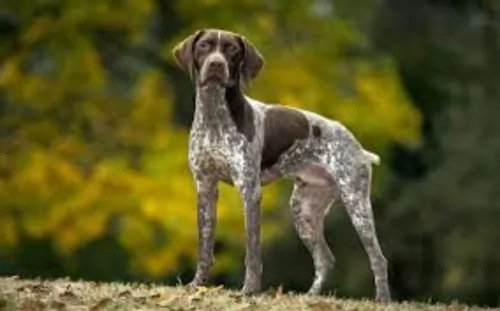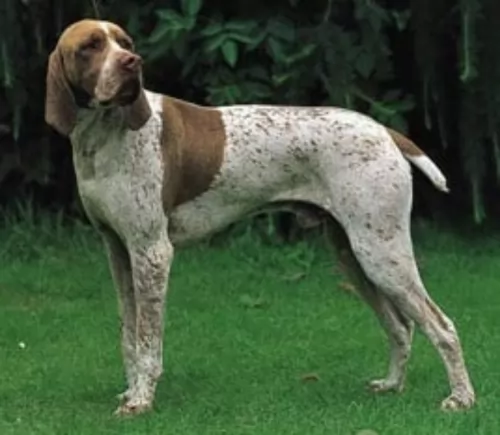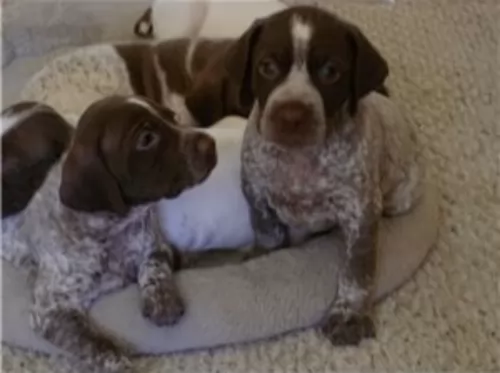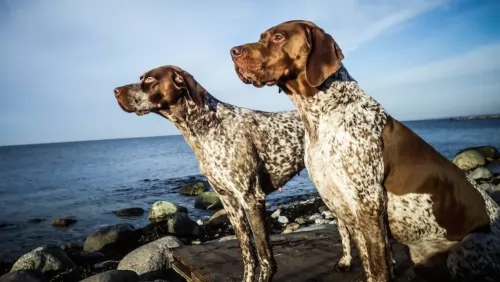 Petzlover
Petzlover Braque Francais (Gascogne Type) is originated from France but Welsh Sheepdog is originated from United Kingdom. Braque Francais (Gascogne Type) may grow 13 cm / 6 inches higher than Welsh Sheepdog. Braque Francais (Gascogne Type) may weigh 7 kg / 16 pounds more than Welsh Sheepdog. Both Braque Francais (Gascogne Type) and Welsh Sheepdog has same life span. Both Braque Francais (Gascogne Type) and Welsh Sheepdog has same litter size. Both Braque Francais (Gascogne Type) and Welsh Sheepdog requires Low Maintenance.
Braque Francais (Gascogne Type) is originated from France but Welsh Sheepdog is originated from United Kingdom. Braque Francais (Gascogne Type) may grow 13 cm / 6 inches higher than Welsh Sheepdog. Braque Francais (Gascogne Type) may weigh 7 kg / 16 pounds more than Welsh Sheepdog. Both Braque Francais (Gascogne Type) and Welsh Sheepdog has same life span. Both Braque Francais (Gascogne Type) and Welsh Sheepdog has same litter size. Both Braque Francais (Gascogne Type) and Welsh Sheepdog requires Low Maintenance.
 The Braques Français – Gascogne – is a hunting dog from southern France’s Gascony region. Known also as the French Gascony Pointer, this dog has descended from Spanish and Italian Pointers. The dog was saved from extinction at the turn of the 20th century.
The Braques Français – Gascogne – is a hunting dog from southern France’s Gascony region. Known also as the French Gascony Pointer, this dog has descended from Spanish and Italian Pointers. The dog was saved from extinction at the turn of the 20th century.
There are actually two breeds of Braque français, with the other being somewhat smaller and known as Braque français, type Pyrénées. Whichever one you have, they are popular hunting dogs in France. The first breed club was established in 1850.
 The Welsh Sheepdog is sometimes referred to as the Welsh Collie, but it is not a collie in anyway. It is the cross between the Border Collie and Welsh Sheepdog that is actually the Welsh Collie. The sheepdog was bred for herding not appearance and they are not all consistent in looks and size. They are a collie type but do not have recent collie ancestors. In fact the Border Collie has basically replaced the Welsh Sheepdog in herding sheep in Wales. The Welsh Sheepdog is still being bred as an indigenous breed. They are still prized for their ability to work independently and herding cattle, pigs, horses and goats as well as sheep. They were originally drovers.
The Welsh Sheepdog is sometimes referred to as the Welsh Collie, but it is not a collie in anyway. It is the cross between the Border Collie and Welsh Sheepdog that is actually the Welsh Collie. The sheepdog was bred for herding not appearance and they are not all consistent in looks and size. They are a collie type but do not have recent collie ancestors. In fact the Border Collie has basically replaced the Welsh Sheepdog in herding sheep in Wales. The Welsh Sheepdog is still being bred as an indigenous breed. They are still prized for their ability to work independently and herding cattle, pigs, horses and goats as well as sheep. They were originally drovers.
In the 18th century there were many different Welsh herding dogs and one drover might have 4-6 different types of sheepdogs as guard dogs, herders and hunters. Most of these breeds were taller than the Welsh Sheepdog. By 1940 there aere only a couple of breeds doing these jobs in Wales. The purebred Welsh Hillman and Black and Tan Sheepdog were on the verge of extinction at that point.
At that time the most common dogs were descendants of the Black and Tan Sheepdog and the Border Collie. The Welsh Sheepdog was still working in central Wales and in the north country. They were purely a working breed and not a show breed in any way. They remain that today.
They are a landrace and very rare today. They have been around for more than 800 years with no effort at standardization for this working dog. They are only registered with the WSS or Welsh Sheepdog Society and the DRA Dog Registry of America.
 The Braque Francais is a dog which looks much like the German Short-haired Pointer. The Braque Francais (Gascogne) is a large breed dog, standing roughly 56 – 69cm. Weight is most times dependent on height, but the average weighs between 35 and 55 pounds. The dog is attractively lean and muscular and the tails have always been docked, although rules and regulations see the breed with a long tail these days. The natural tail of the Braque Francais is medium length. The eyes of this breed are brown or yellow and the ears are medium in length and floppy. The coat of the Gascogne is short and dense and in two colors – white and chestnut patching and mottling.
The Braque Francais is a dog which looks much like the German Short-haired Pointer. The Braque Francais (Gascogne) is a large breed dog, standing roughly 56 – 69cm. Weight is most times dependent on height, but the average weighs between 35 and 55 pounds. The dog is attractively lean and muscular and the tails have always been docked, although rules and regulations see the breed with a long tail these days. The natural tail of the Braque Francais is medium length. The eyes of this breed are brown or yellow and the ears are medium in length and floppy. The coat of the Gascogne is short and dense and in two colors – white and chestnut patching and mottling.
The dog is a keen tracker and is an excellent game and gun dog with some of them requiring more training than others. Training and socialization makes the Braque Francais an excellent, obedient pet who is eager to please and he is considered to be easily trainable, learning quickly. He loves his human family and is noted for his gentle, friendly nature, and he therefore makes and excellent family pet where there are children and other pets.
 Bred for their herding abilities not their appearance, the Welsh Sheepdog can vary in color, build and size. They have long legs, broad chests and wide muzzles. They are all around bigger than the Border Collie. They come in black and white, tricolor, red and white and merle. The coat can be short or long and the ears pricked and folded at the top.
Bred for their herding abilities not their appearance, the Welsh Sheepdog can vary in color, build and size. They have long legs, broad chests and wide muzzles. They are all around bigger than the Border Collie. They come in black and white, tricolor, red and white and merle. The coat can be short or long and the ears pricked and folded at the top.
They look most like the Border Collie with a taller, broader, more solid build. They typically are stronger than the Border. Their head is distinctly collie shaped, flat and broad with the wide muzzle. The nose is black and the eyes are oval and brown. The merles can have striking blue eyes.
This is an athletic dog and you can tell by looking at her. Well muscled, broad back and neck with a long upward tail. Their tough paws are perfect for the rough terrain and Wales mountainsides.
 The attractive Braque Francais is a calm, contented dog who is also affectionate, social and intelligent. He is already a well mannered dog but will do even better with training and socialization. However, Braque Francais don’t take well to aggressive training and done the wrong way, the dog can end up being timid and confused.
The attractive Braque Francais is a calm, contented dog who is also affectionate, social and intelligent. He is already a well mannered dog but will do even better with training and socialization. However, Braque Francais don’t take well to aggressive training and done the wrong way, the dog can end up being timid and confused.
Wanting to please and being an intelligent dog, training should be fun, lighthearted but firm. In exchange you’re going to have an awesome friend from this wonderful, loving dog breed.
 1Children friendliness not really – aloof and concerned with job- all this dog wants to do is work.
1Children friendliness not really – aloof and concerned with job- all this dog wants to do is work.
3.Adaptability – Not an inside dog in any way. They need several hours of exercise per day.
 You won’t find many health issues with this active breed but nonetheless hip and joint issues will need to be watched. If you are considering a Braque Français puppy, you’ll want to be selective in choosing a responsible breeder. A healthy puppy with the right environment, can get to up to 15 years of age.
You won’t find many health issues with this active breed but nonetheless hip and joint issues will need to be watched. If you are considering a Braque Français puppy, you’ll want to be selective in choosing a responsible breeder. A healthy puppy with the right environment, can get to up to 15 years of age.
Ectropion and entropion in dogs affect their eyelids. Ectropion is where the eyelids roll outward, whereas entropion is where the eyelids curve inward, irritating the eye. Because visual and skeletal problems occur in this breed, it can be recommended that owners have their pets tested by both the Canine Eye Registration Foundation as well as the Orthopedic Foundation for Animals.
 Usually an indigenous rare breed does not have a lot of genetic or hereditary health concerns. This is a little different with the Welsh Sheepdog can suffer from any of these conditions.
Usually an indigenous rare breed does not have a lot of genetic or hereditary health concerns. This is a little different with the Welsh Sheepdog can suffer from any of these conditions.
• Epilepsy – Most respond well to medication and others might not even need medication.
• Collie Eye Anomaly – This is common in collie breeds like the rough coated collie. The development of the Choroid is impaired resulting in harm to the circulation of blood to the eye.
• Atopic Dermatitis – Allergic skin disorder irritating paws, ears, and perineum.
• PRA Progressive Retinal Atrophy - deterioration of the retina can lead to blindness. Inherited.
 Brushing the coat twice a week will get rid of loose hairs and maintain the sheen of the coat. Also, as a floppy eared breed, attention should be given to the ears to prevent infections. He will also need to have his teeth brushed with dog toothpaste and brush to prevent the build-up of damaging plaque and his nails will also require a clipping if they don’t manage to wear down naturally.
Brushing the coat twice a week will get rid of loose hairs and maintain the sheen of the coat. Also, as a floppy eared breed, attention should be given to the ears to prevent infections. He will also need to have his teeth brushed with dog toothpaste and brush to prevent the build-up of damaging plaque and his nails will also require a clipping if they don’t manage to wear down naturally.
Daily activity will be needed for this dog and he will want a walk every day. He certainly isn’t a dog you can leave indoors or outside in your backyard day after day. Any activities that require physical exertion will be good because they are exceptional athletes. If you are a cyclist or a runner, take him with you – he’ll love it.
Your Braque Francais loves energetic activities and for this he will require an excellent nutrient-rich diet. Nutrient-rich dog foods are higher in protein and fat and lower in carbohydrates. It’s important to check out the carbohydrate content in commercial dog foods to avoid those one high in carbohydrates.
Your vet can always advise you on a good quality food and you can always give him your own home-prepared foods which include rice, vegetables and meat. Certainly include some raw meat into his diet every now and then to avoid skin problems. Fresh, cool water must be available to him night and day.
 1Feeding the puppy active dog feed high quality high protein food. 3-4 x day 1-2 cups
1Feeding the puppy active dog feed high quality high protein food. 3-4 x day 1-2 cups
2.Feeding the adult Active dog feed high quality high protein 2x day 2 cups a day.
4. Games and Exercises This is an extremely active breed that needs a job. They are not the best pets they are working dogs. They need a lot of exercise. They are not good at living indoors. At least 2 hours of exercise daily is a must.